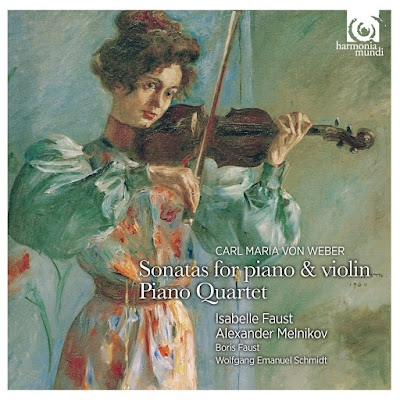The unjustly neglected piano quartet (J76) was completed in September
of the year 1809, which the 22-year-old Weber spent in Stuttgart. It
was originally offered to the publisher Hans Georg Nägeli, but he
rejected it, advising the composer that it created wanton ‘confusion in
the arrangement of its ideas’ and indeed too obviously imitated the
‘bizarreries’ of Beethoven. However, the work was issued a year later by
the Bonn firm of Beethoven’s friend and admirer Nikolaus Simrock, whose
ears were more receptive to the peculiarities of the score than Nägeli.
And in the following year, 1811, Simrock once again stepped into the
breach in the matter of the publication of the Six Violin Sonatas
(J99–104). These were written to a tight deadline in the late summer of
1810, on commission from the Offenbach publisher Johann Anton André, who
had in mind a collection of short pieces of moderate difficulty for the
domestic music-making of the upper middle classes. Unhappy with the
concomitant artistic limitations, Weber took the commission only
half-heartedly and repeatedly complained during the compositional
process of this ‘swine of a job’, which cost him ‘more sweat than the
same number of symphonies’. His annoyance was all the greater when André
rejected the finished work out of hand because it did not correspond to
his expectations. When Simrock finally published these pieces in
Bonn in two instalments under the title 'Progressive sonatas for
fortepiano with obbligato violin, composed for and dedicated to amateur
musicians', with the opus number 10, Weber had only remotely followed
André’s specifications. It is true that the technical demands on the
performers, especially the violin, are fairly modest, but in terms of
content the 6 short two- or three-movement sonatinas far outstrip mere
pedagogical intentions.They were written to please amateurs, but quite
as much to satisfy connoisseurs of any era. Isabelle Faust
follows up the success of recent recordings for hm [Bach volume 2, Berg
and Beethoven with Claudio Abbado] with regular partner Alexander
Melnikov and her brother Boris, currently principal viola of the Bremer
Philharmoniker, and Wolfgang Emanuel Schmidt of whom Mstislav
Rostropovich has said: ‘Wolfgang Emanuel Schmidt is one of the leading
cellists of his generation, of our time’.
Suscribirse a:
Enviar comentarios (Atom)





There are some wrong in this file, it open but are blocked.
ResponderEliminarThis file is blocked and not open.
ResponderEliminarEl enlace facilitado no funciona
ResponderEliminarRuego restablezcan en lace reparado
ResponderEliminar